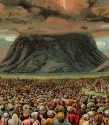 Building upon the previous essay about bitachon, trust in G-d, when it comes to severe difficulties in life, should we always expect that things will improve, or should we sometimes just accept that they won’t get better? And can we pray for one on the verge of death? This is Rabbi Asher Resnick’s second of two essays addressing... Read more »
Building upon the previous essay about bitachon, trust in G-d, when it comes to severe difficulties in life, should we always expect that things will improve, or should we sometimes just accept that they won’t get better? And can we pray for one on the verge of death? This is Rabbi Asher Resnick’s second of two essays addressing... Read more »  Building upon the previous essay about bitachon, trust in G-d, when it comes to severe difficulties in life, should we always expect that things will improve, or should we sometimes just accept that they won’t get better? And can we pray for one on the verge of death? This is Rabbi Asher Resnick’s second of two essays addressing... Read more »
Building upon the previous essay about bitachon, trust in G-d, when it comes to severe difficulties in life, should we always expect that things will improve, or should we sometimes just accept that they won’t get better? And can we pray for one on the verge of death? This is Rabbi Asher Resnick’s second of two essays addressing... Read more » 



























